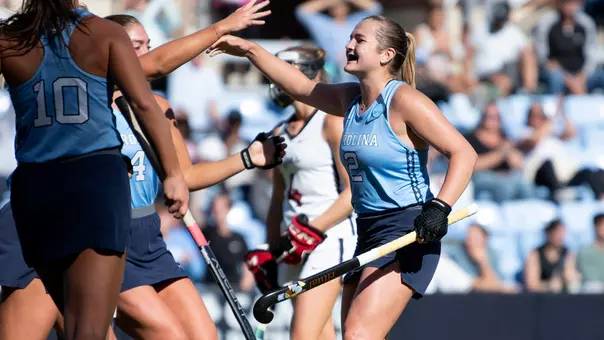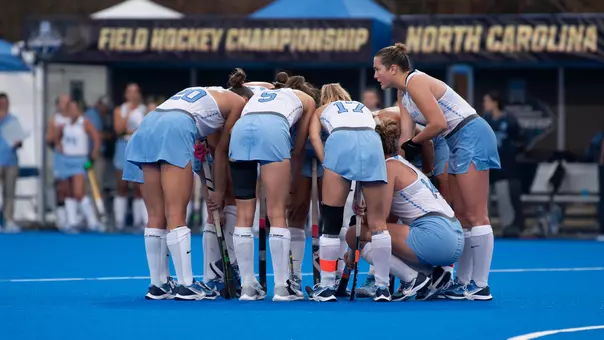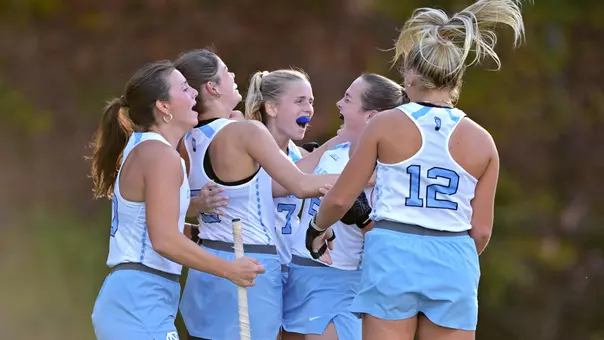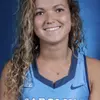University of North Carolina Athletics
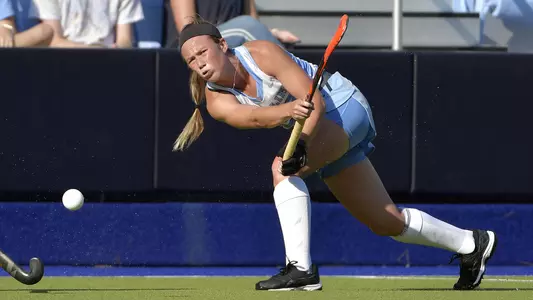
From her spot in the Tar Heel midfield, Megan DuVernois does what her team needs to win.
Photo by: Jeffrey A. Camarati
No Matter What Her Team Needs, DuVernois Delivers
November 16, 2019 | Field Hockey
By Matt Penner
She turns in one motion and flicks the ball over the goalkeeper's left shoulder. It's 1-0 Tar Heels. That go-ahead goal would prove to be the gamewinner as UNC beat Maryland 2-0 to win the 2018 NCAA Field Hockey Championship.
The play unfolded as forward Erin Matson dribbled into the box and passed to forward Meredith Sholder, who immediately passed to Megan DuVernois for the goal. DuVernois' teammates come from all parts of the field to hug her, though it doesn't compare to the celebration that ensues when the clock runs out.
But this year, DuVernois doesn't play much forward. She used to split time between forward and midfielder, but as a full-time midfielder this season, her job is to set up the forwards to score.
She's a self-proclaimed passer. She likes to "thread," or place the ball behind the defense.
"If I see a space, I'll give it," she says. "Always put it to space so someone can run onto it, or if it's in a tight spot, I'll try to thread it through."
DuVernois, now a senior, has started all 20 games in the midfield this season. She retreats when the ball comes to the defensive half, and she sprints up if it goes to the opposing team's goal. Unlike her NCAA Championship goal, she doesn't usually end up with the shot on a break.
She maintains that she prefers to pass over shoot, though she has six goals this season (three of them gamewinners, including the only score in a 1-0 win over Old Dominion) and 22 for her career. As the team's go-to shooter for penalty strokes, she's 3-for-3 this year.
"I'm so proud of her," UNC coach Karen Shelton says. "She's been a very versatile and steady player for us throughout her career and she shows great mental toughness by being able to handle and accept the penalty stroking responsibility."
Her game is built on precise movements. She knows the right angles, where to be, how to bridge the gap between attack and defense. She communicates with the defender behind her on where to be.
Her central role on the field relies on her chemistry with her teammates. "For me, when we talk about field hockey and what we need to change within the team or what new mentality we need to use within the team, that's been really helpful," she says.
The team started weekly sports psychology meetings during the 2016 season, and DuVernois appreciates that team conflicts of all kinds were thrust into the open to be fixed. With it, trust in her teammates has grown.
"I was very set in my ways – I didn't really like feedback" she says of her freshman-year self. "I would only take it from coaches."
But DuVernois' work-rate wouldn't have come without feedback.
"On a corner breakout, I've definitely been yelled at by Coach for not sprinting as hard as I can back to the circle to help defend," says DuVernois. "If I lose a ball, I'm the first one on it, or at least try to help double coming back."
She's conditioned her way through the "wall of fatigue" she used to hit as a freshman. She can finish a run, even the rest of the game. And when she's subbed off, she sprints off.
Her hands may go on her knees for a few seconds. A coach tells her to make a tactical adjustment. A teammate may do the same. A few minutes later, she sprints back on.
"I think her discipline and hard work on the field and in the weight room has brought her to where she is now," says senior Yentl Leemans, Duvernois' best friend on the team and another of the Tar Heel midfielders.
Leemans transferred to Carolina before the 2018 season, and their fast friendship helped DuVernois feel more connected to the team.
Much like her style of play, DuVernois hopes to offer friendship that supports her teammates where they're at. She loves to listen, offer advice or provide an optimistic perspective to a tough situation.
"I see her as a very thoughtful and loving person who always has a smile on her face," says Leemans. "I think I can count the amount of times I have seen her in a bad mood on one hand."
Because Leemans' parents live in the Netherlands, they don't make it to many Carolina field hockey games. DuVernois' family has welcomed her, bringing her along to hang out after games and inviting her to join the family for Thanksgiving.
On the field, Leemans touts Duvernois' passing ability. She says DuVernois can gauge if a forward wants a hard pass or a lifted ball behind the defense.
"She would rather pass the ball than carry it," says Leemans, "which makes her a very good team player."
DuVernois was sold on Carolina when she attended summer camps in high school. The more she looked into the school, the more she liked the academics. Carolina became her benchmark whenever she toured another school.
She will graduate in May with a degree in exercise and sport science and a minor in biology. Bio 278, a class on animal behavior, confirmed she wants to work with animals in some capacity. She hopes to eventually work in animal rehabilitation or as an animal caretaker, but in the short term she'd like to continue her field hockey career with a club or university team, especially if she's able to earn a master's degree in England.
Whe she leaves Chapel Hill, she'll remember Shelton's sayings, or "Sheltonisms," and lessons she says push her to be "goal-oriented" and "never give up on what you want to do." Perhaps this mindset is embodied by a sign in the team building that reads, "Suck it up, buttercup."
DuVernois doesn't take anything for granted because her coach never did. It's evidenced by the alumni DuVernois sees come back who thrive on Shelton's life lessons from multiple decades.
"I'm part of her legacy, which is really fun," says DuVernois. "I trust her advice on anything."
Every time Shelton yelled at her to get back, every bit of feedback, every sports psych session – all of it molded DuVernois into a confident facilitator in the midfield.
"Starting for us in the midfield is not easy to do – it's the engine of our team," Shelton said, "and she's been solid and steady throughout the year.
"She's a player I've really enjoyed coaching. She always has a really good attitude every day, she comes with a smile, she works hard and she's grown not only as a player but as a human being. I'm so proud of her as a senior, and hopefully we have a little bit more to do."
She turns in one motion and flicks the ball over the goalkeeper's left shoulder. It's 1-0 Tar Heels. That go-ahead goal would prove to be the gamewinner as UNC beat Maryland 2-0 to win the 2018 NCAA Field Hockey Championship.
The play unfolded as forward Erin Matson dribbled into the box and passed to forward Meredith Sholder, who immediately passed to Megan DuVernois for the goal. DuVernois' teammates come from all parts of the field to hug her, though it doesn't compare to the celebration that ensues when the clock runs out.
But this year, DuVernois doesn't play much forward. She used to split time between forward and midfielder, but as a full-time midfielder this season, her job is to set up the forwards to score.
She's a self-proclaimed passer. She likes to "thread," or place the ball behind the defense.
"If I see a space, I'll give it," she says. "Always put it to space so someone can run onto it, or if it's in a tight spot, I'll try to thread it through."
DuVernois, now a senior, has started all 20 games in the midfield this season. She retreats when the ball comes to the defensive half, and she sprints up if it goes to the opposing team's goal. Unlike her NCAA Championship goal, she doesn't usually end up with the shot on a break.
She maintains that she prefers to pass over shoot, though she has six goals this season (three of them gamewinners, including the only score in a 1-0 win over Old Dominion) and 22 for her career. As the team's go-to shooter for penalty strokes, she's 3-for-3 this year.
"I'm so proud of her," UNC coach Karen Shelton says. "She's been a very versatile and steady player for us throughout her career and she shows great mental toughness by being able to handle and accept the penalty stroking responsibility."
Her game is built on precise movements. She knows the right angles, where to be, how to bridge the gap between attack and defense. She communicates with the defender behind her on where to be.
Her central role on the field relies on her chemistry with her teammates. "For me, when we talk about field hockey and what we need to change within the team or what new mentality we need to use within the team, that's been really helpful," she says.
The team started weekly sports psychology meetings during the 2016 season, and DuVernois appreciates that team conflicts of all kinds were thrust into the open to be fixed. With it, trust in her teammates has grown.
"I was very set in my ways – I didn't really like feedback" she says of her freshman-year self. "I would only take it from coaches."
But DuVernois' work-rate wouldn't have come without feedback.
"On a corner breakout, I've definitely been yelled at by Coach for not sprinting as hard as I can back to the circle to help defend," says DuVernois. "If I lose a ball, I'm the first one on it, or at least try to help double coming back."
She's conditioned her way through the "wall of fatigue" she used to hit as a freshman. She can finish a run, even the rest of the game. And when she's subbed off, she sprints off.
Her hands may go on her knees for a few seconds. A coach tells her to make a tactical adjustment. A teammate may do the same. A few minutes later, she sprints back on.
"I think her discipline and hard work on the field and in the weight room has brought her to where she is now," says senior Yentl Leemans, Duvernois' best friend on the team and another of the Tar Heel midfielders.
Leemans transferred to Carolina before the 2018 season, and their fast friendship helped DuVernois feel more connected to the team.
Much like her style of play, DuVernois hopes to offer friendship that supports her teammates where they're at. She loves to listen, offer advice or provide an optimistic perspective to a tough situation.
"I see her as a very thoughtful and loving person who always has a smile on her face," says Leemans. "I think I can count the amount of times I have seen her in a bad mood on one hand."
Because Leemans' parents live in the Netherlands, they don't make it to many Carolina field hockey games. DuVernois' family has welcomed her, bringing her along to hang out after games and inviting her to join the family for Thanksgiving.
On the field, Leemans touts Duvernois' passing ability. She says DuVernois can gauge if a forward wants a hard pass or a lifted ball behind the defense.
"She would rather pass the ball than carry it," says Leemans, "which makes her a very good team player."
DuVernois was sold on Carolina when she attended summer camps in high school. The more she looked into the school, the more she liked the academics. Carolina became her benchmark whenever she toured another school.
She will graduate in May with a degree in exercise and sport science and a minor in biology. Bio 278, a class on animal behavior, confirmed she wants to work with animals in some capacity. She hopes to eventually work in animal rehabilitation or as an animal caretaker, but in the short term she'd like to continue her field hockey career with a club or university team, especially if she's able to earn a master's degree in England.
Whe she leaves Chapel Hill, she'll remember Shelton's sayings, or "Sheltonisms," and lessons she says push her to be "goal-oriented" and "never give up on what you want to do." Perhaps this mindset is embodied by a sign in the team building that reads, "Suck it up, buttercup."
DuVernois doesn't take anything for granted because her coach never did. It's evidenced by the alumni DuVernois sees come back who thrive on Shelton's life lessons from multiple decades.
"I'm part of her legacy, which is really fun," says DuVernois. "I trust her advice on anything."
Every time Shelton yelled at her to get back, every bit of feedback, every sports psych session – all of it molded DuVernois into a confident facilitator in the midfield.
"Starting for us in the midfield is not easy to do – it's the engine of our team," Shelton said, "and she's been solid and steady throughout the year.
"She's a player I've really enjoyed coaching. She always has a really good attitude every day, she comes with a smile, she works hard and she's grown not only as a player but as a human being. I'm so proud of her as a senior, and hopefully we have a little bit more to do."
Players Mentioned
UNC Men's Basketball: Tar Heels Escape Ohio State, 71-70
Saturday, December 20
Tar Heels in the Community pres. by NC Electric Co-ops - Share Your Holiday 2025 - December 18, 2025
Friday, December 19
WBB: Post-UNCW Press Conference - Dec. 17, 2025
Thursday, December 18
UNC Women's Basketball: Brooks, Toomey Blow Heels Past UNCW, 84-34
Thursday, December 18










